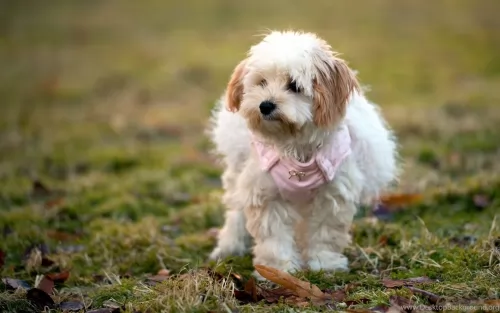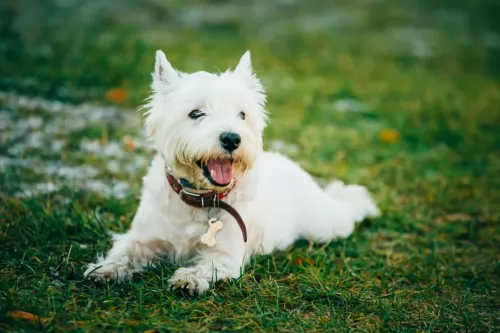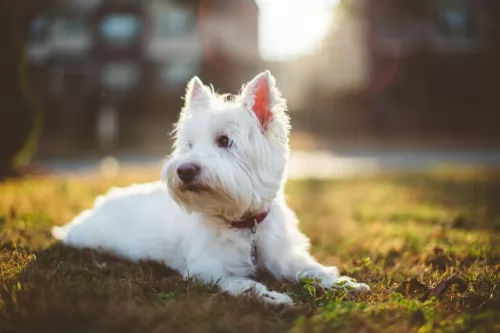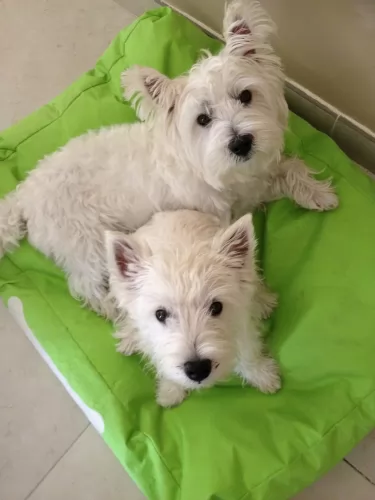 Petzlover
Petzlover West Highland White Terrier is originated from United Kingdom but Caucasian Shepherd is originated from Russia. West Highland White Terrier may grow 45 cm / 17 inches shorter than Caucasian Shepherd. West Highland White Terrier may weigh 90 kg / 198 pounds lesser than Caucasian Shepherd. West Highland White Terrier may live 4 years more than Caucasian Shepherd. West Highland White Terrier may have less litter size than Caucasian Shepherd. West Highland White Terrier requires High Maintenance. But Caucasian Shepherd requires Moderate Maintenance
West Highland White Terrier is originated from United Kingdom but Caucasian Shepherd is originated from Russia. West Highland White Terrier may grow 45 cm / 17 inches shorter than Caucasian Shepherd. West Highland White Terrier may weigh 90 kg / 198 pounds lesser than Caucasian Shepherd. West Highland White Terrier may live 4 years more than Caucasian Shepherd. West Highland White Terrier may have less litter size than Caucasian Shepherd. West Highland White Terrier requires High Maintenance. But Caucasian Shepherd requires Moderate Maintenance
 The West highland white terrier originated from Poltalloch in Scotland. So they were initially called as Poltalloch terrier and after that they were called as Roseneath terrier. They were initially used for hunting fox, badger, otter and in killing the vermin like rats.
The West highland white terrier originated from Poltalloch in Scotland. So they were initially called as Poltalloch terrier and after that they were called as Roseneath terrier. They were initially used for hunting fox, badger, otter and in killing the vermin like rats.
The breed history says that Colonel Malcolm of Poltalloch was the reason for the Westie's white colour. This is because in 19th centuryhe went for hunting with his dogs and accidentally he shot his dog as its colour was as fox. So he decided to breed only white colour dogs.
 This working dog is more than 2 000 years old, hailing from the Caucasus Mountains near the Georgian Republic, Russia.
This working dog is more than 2 000 years old, hailing from the Caucasus Mountains near the Georgian Republic, Russia.
The Caucasian Shepherd Dog is an ancient breed, always having been used to guard livestock in the mountains. Some believe they came from domesticated wolves, while others believe their ancestry includes Mastiffs and other breeds.
It was in the 1960s that the dog was used in Germany for patrol along the Berlin Wall. This dog is also known as the Caucasian Ovcharka and he is large and powerful, always being ready to take on anyone who threatens him or the livestock he is guarding.
His origins can be traced far back and eventually the dog found its ways to the USA where dog clubs were formed.The Caucasian Shepherd Dog is one of the oldest Molosser breeds, and today they are mostly appreciated for being wonderful family companions and watchdogs.
 The Westie can be said as that a small dog having the talents of the big dog. They are very popular for their obedience. They are also working as therapy dogs and also some in search and rescue teams. The home having Westie will have fun always and be enthusiastic. They will suit them for country or city living, but they like to live with their family. They are well suitable for apartment living, but some training should be given to them for not barking. They can stay in home when you are at work. Westie can be taken to travel, whether it may be long vacation or a short visit.
The Westie can be said as that a small dog having the talents of the big dog. They are very popular for their obedience. They are also working as therapy dogs and also some in search and rescue teams. The home having Westie will have fun always and be enthusiastic. They will suit them for country or city living, but they like to live with their family. They are well suitable for apartment living, but some training should be given to them for not barking. They can stay in home when you are at work. Westie can be taken to travel, whether it may be long vacation or a short visit.
They are quick learners and so training them is not difficult. Mistakes of them can be corrected patiently since they don't like harsh activities against them. Westie will definitely bark when he sees something or hear different sounds. He will bark on seeing visitors or even other dogs. Sometimes they will bark for very silly things but when given appropriate training in their young stage, they can bark only for alerts.
 The Caucasian Shepherd is a large, impressive looking dog standing at between 64 – 75cm in height and weighing between 45 – 70 kg. He has an almost bear-like appearance. His coat can be shortish or even fairly long, and in different colors such as white, tan, brindle, grey and cream with a black mask.
The Caucasian Shepherd is a large, impressive looking dog standing at between 64 – 75cm in height and weighing between 45 – 70 kg. He has an almost bear-like appearance. His coat can be shortish or even fairly long, and in different colors such as white, tan, brindle, grey and cream with a black mask.
The puppies are born black and then lighten as they grow up. He has a large head with the muzzle being smaller than the skull, narrowing slightly. The nose is black and the ears are set high and are floppy with dark eyes. The tail is set high and is long.
The Caucasian Shepherd is an intelligent breed but he must be properly trained and socialized as he can be stubborn and want to go his own way.
He is a balanced dog and he won’t deliberately hurt whom he regards as family, but he shows distrust towards strangers. While socialization and training relax and calm a dog, the Caucasian Shepherd isn’t regarded as the best dog to have with children around. This is because he comes from a lineage of guard dogs, bred to fight and guard.
He is a dog breed that will require a firm, strong owner and if you don’t have a lot of time on your hands, the Caucasian can be difficult to manage and perhaps isn’t the best choice for a first-time dog owner.
 The Westie is friendly with children but not all the time. So some care should be taken while they are near children.
The Westie is friendly with children but not all the time. So some care should be taken while they are near children.
They like to chase rodents like rabbits as they are interested in hunting.
They are suitable for apartment living unless they are left alone for a very long time. They love cold weather more than hot.
They can be trained by giving some extra efforts.
 Loyal, strong, and brave, the Caucasian Shepherd Dog does an excellent job protecting his human family. He is a territorial dog and in the past he has always been ready to take on wolves and bear to protect his sheep. He isn't the best choice for first time dog-owners and where there are small children in the home.
Loyal, strong, and brave, the Caucasian Shepherd Dog does an excellent job protecting his human family. He is a territorial dog and in the past he has always been ready to take on wolves and bear to protect his sheep. He isn't the best choice for first time dog-owners and where there are small children in the home.
He will do well to be trained and socialized as he becomes an obedient, patient, gentle, loving pet that becomes an excellent companion and protector.
 Like all breeds there may be some health issues, even though the Caucasian Shepherd is generally a healthy dog. There are some common illnesses that every dog can get and which every responsible dog owner should be aware of -
Like all breeds there may be some health issues, even though the Caucasian Shepherd is generally a healthy dog. There are some common illnesses that every dog can get and which every responsible dog owner should be aware of -
One or two episodes of diarrhea isn’t an emergency, but ongoing diarrhea can lead to dehydration. If your dog is vomiting, he is lethargic and constantly emptying his bowels, see your vet if the diarrhea persists.
Parasites such as fleas and ticks and even internal parasites such as intestinal worms can drain the life from your pet. It is wise to find out about different parasites so that you can protect your dog. Find out what your vet’s treatment options are for parasites.
 The puppy should be fed 3 to 4 times per day as it requires a considerable amount for their growth. Cooked chicken breast and turkey are best for them and also vegetables should be given to them. Beef and chicken should be kept a limit as it will lead to itchy skin and allergies.
The puppy should be fed 3 to 4 times per day as it requires a considerable amount for their growth. Cooked chicken breast and turkey are best for them and also vegetables should be given to them. Beef and chicken should be kept a limit as it will lead to itchy skin and allergies.
The preferable food for the Westie is home cooked. The home food will only contain all the essential nutrients for the Westie.
Eventhough the Westie is suitable for apartment living it is recommended to have a daily walk for him to be active and refreshing.
They should be made to play for atleast 30 minutes per day for their health as to not gain overweight. Grown up children can play with them as they like it.
 The Caucasian Shepherd Dog has a thick double coat that will certainly require brushing twice a week. The coat comes in different lengths – short, medium and long. The hair is mostly long and the long tail is also feathery. The best way to groom your large, furry pet is to invest in some good grooming tools such as a good brush to keep your pet’s hair in tip-top condition.
The Caucasian Shepherd Dog has a thick double coat that will certainly require brushing twice a week. The coat comes in different lengths – short, medium and long. The hair is mostly long and the long tail is also feathery. The best way to groom your large, furry pet is to invest in some good grooming tools such as a good brush to keep your pet’s hair in tip-top condition.
His nails will need to be trimmed regularly, his ears will also need to be checked to avoid wax build-up and the accumulation of grime. This can lead to an ear infection. His teeth should be brushed 2 or 3 times a week with special dog toothbrush and toothpaste.
The Caucasian Shepherd isn’t going to do well in a small home with tiny garden in the city. He is a big dog that will require a large yard even though he is a fairly low-energy dog. He will be suited to a family that is active, that will take him on daily walks, hikes and include some ball games.
You will need to change your Caucasian Shepherd Dog’s food as he goes through the different phases of his life, from puppy to adulthood. Speak to your veterinarian about a commercially produced dog food is you’re unable to give him home-made food. These foods are available in breed-specific and age-specific formulas.
Reputable breeders will also help you ensure that you know how to start feeding your puppy. Caucasian Shepherds are a large breed and apart from their kibble, you’ll want to include rice, vegetables and cooked chicken from time to time in his kibble and also include raw meat occasionally.
If you're unsure, ask your veterinarian or breeder about the best diet to ensure his longevity. Clean, fresh water should be available at all times.